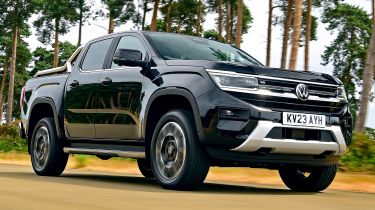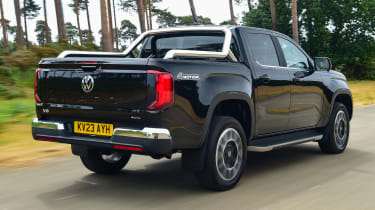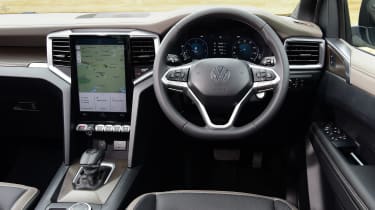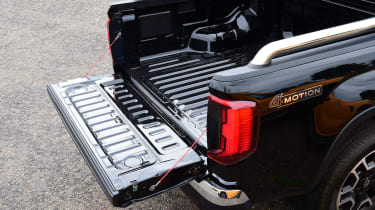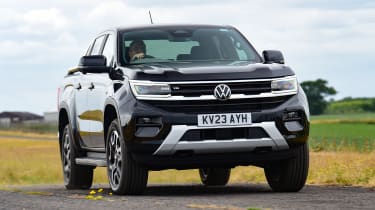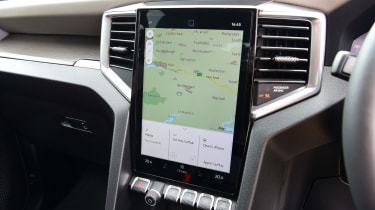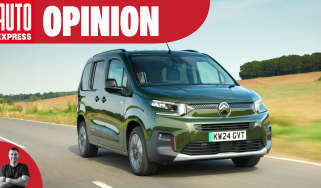Volkswagen Amarok pick-up review
If you’re after a pick-up truck that feels smarter and more sophisticated than the rest, then the VW Amarok is the one to choose
The Volkswagen Amarok has always felt a little more upmarket (both inside and out) than the closely related Ford Ranger, although it doesn’t offer quite enough to surpass our reigning Pick-up of the Year. The Amarok feels more like a car to drive than ever before, and it’s still capable of serving as a workhorse, but its lineup is more limited than its closest rivals. It’s also more expensive to buy, though that might just be the price you pay for a classy and desirable truck like this.
About the Volkswagen Amarok
Volkswagen is well known for its impressive range of family hatchbacks and SUVs, but the German manufacturer also produces a variety of commercial vehicles, including all-electric panel vans, enormous campervans, and a pick-up truck: the Amarok.
The original Amarok arrived in the UK in 2012, was updated in 2016 and remained in production until 2020. Its successor was unveiled in 2022, with a bold new look, lots of tech and more than a few components shared with the latest Ford Ranger.
That’s because the second-generation Amarok and Ranger are products of the ongoing cooperation between VW and Ford – the same partnership which allowed the Blue Oval to use the VW ID.4’s MEB platform for its new Explorer SUV. It’s a similar story with the two pick-ups, as the Amarok and Ranger use the same engines, suspension, transmissions and electronics, though you’d never tell by looking at them because of their strikingly different designs.
Used - available now

2017 Skoda
Fabia
42,900 milesManualPetrol1.2L
Cash £8,860
2021 Skoda
Fabia
105,650 milesManualPetrol1.0L
Cash £6,295
2023 Skoda
Fabia
16,459 milesManualPetrol1.0L
Cash £14,995
2018 Skoda
Fabia
84,654 milesManualPetrol1.0L
Cash £5,494One practical difference between the two is the range of body styles. The Amarok is only available as a four-door double cab, while the Ranger is also offered as a more utilitarian, two-door single cab truck, and now comes with plug-in hybrid power, too. There’s no performance version of the Amarok either, in case you wanted an alternative to Ford’s Ranger Raptor.
The Toyota Hilux is more versatile still, offering buyers the choice of Single, Extra and Double Cab bodies. The Hilux is a lot older than the Amarok however, which is clear once you take a seat inside and start to play with the technology. The only pick-up trucks on sale in the UK now are the Isuzu D-Max, KGM Musso and all-electric Maxus T90EV. Of course, you can still buy second hand examples of the Nissan Navara, Mercedes X-Class and Mitsubishi L200.
The Amarok lineup consists of the four specifications: Life, Style, PanAmericana and Aventura. The Amarok Life is the only model powered exclusively by a 2.0-litre four-cylinder diesel engine, which can be paired with either a six-speed manual gearbox or a 10-speed automatic transmission. Style-spec models are available with either the four-pot or a 3.0-litre V6, both mated to the Ford-scoured 10-speed auto. Meanwhile PanAmericana and Aventura-spec trucks only feature a 3.0-litre V6 diesel under the bonnet, and a 10-speed auto. Every model gets 4MOTION four-wheel drive as standard.
The Amarok Life starts from around £42,000 (inc. VAT) and comes with cloth upholstery, 17-inch alloy wheels, an eight-inch digital driver’s display and a 10-inch portrait infotainment touchscreen with wireless Apple CarPlay and Android Auto. Safety kit includes lane assist, front and rear parking sensors, a reversing camera, adaptive cruise control and road sign recognition.
Style trim ups the starting price to about £52,500 (inc. VAT), but in return you get microfleece upholstery, 18-inch diamond-cut alloys, electric front seats, carpets, larger 12-inch instrument display and central touchscreen, matrix LED headlights, a 360-degree parking camera system, park assist with rear traffic alert, wireless smartphone charging, tyre pressure monitors and a roll hoop for the load bed.
The Amarok PanAmericana, which starts from a little over £58,000 (inc. VAT), has a much more rugged look, with black alloy wheels and exterior trim, silver roof rails and an X-themed grille design. Inside is full leather trim and a Harman Kardon sound system, while a rear diff lock and under-body guard boost its off-road ability.
Finally, sitting at the very top of the range, is the Amarok Aventura. With prices for the range-topper starting at a whisper over £59,000 (inc.VAT), the price bump from the PanAmericana is relatively small. For the extra money you get 21-inch wheels as standard, softer leather upholstery inside, a heated steering wheel and more chrome and silver trim than other models in the lineup.
However, one important detail of the Aventura model is that it lacks the all-important one-tonne payload needed to qualify as a commercial vehicle, meaning the PanAmericana is the highest-spec model that’s charged the flat rate of Benefit-in-Kind tax for LCVs.
Another more significant point to bear in mind, is that from April 2025, double cab pick-up trucks are set to be treated as company cars for tax purposes, which means a big rise in benefit-in-kind (BIK) tax paid by drivers.
MPG, CO2 and running costs
Volkswagen may well be sprinting towards an all-electric future with its passenger cars, and has launched a zero-emissions van in the form of the ID. Buzz Cargo, but the Amarok is sticking with trusty diesel power for now. There are just two engines on offer: a 2.0-litre four-cylinder and a 3.0-litre V6.
According to VW, the four-pot motor will return up to 33.6mpg in the base Amarok Life, or 32.5mpg if you pair it with the optional 10-speed automatic. Upgrading to Style trim causes fuel economy to take an almost imperceptible hit, with the same engine/auto’ box setup capable of returning 32.1mpg at best.
Volkswagen claims that the 3.0-litre V6 and 10-speed automatic combination can return up to 28mpg, whether it’s a Style, PanAmericana or Aventuras-spec Amarok. That said, we managed to average 28.3mpg from a 3.0 V6 Amarok Style during our pick-up truck group test between the Amarok, Ford Ranger and Toyota Hilux. While it performed slightly better than the V6-powered Ranger we also tested, it couldn’t match the 32.1mpg we saw from the four-cylinder Ranger Wildtrak. CO2 emissions range from 221g/km for the manual Amarok Life to a whopping 265g/km for the range-topping Amarok Aventura.
Pick-up trucks currently offer some appeal to business users as those capable of hauling a one-tonne payload are eligible for the same annual Benefit-in-Kind rates, regardless of the list price. Currently they stand at £792 for a basic-rate taxpayer, or £1,584 if you’re in the 40 per cent bracket. The range-topping Amarok Aventura doesn’t have a one-tonne payload capacity, so doesn’t qualify for the current commercial-vehicle tax rate. As a result, running one as a company car will be costly, due to its high CO2 emissions.
However, from April 2025, the Government says it will treat all double cab pick-up vehicles with a payload of one tonne or more as a company car for tax purposes, which means they will be much more expensive to run for business users, no matter which version you opt for.
Load space and practicality
Unlike its Ranger and Hilux rivals, the Amarok only comes in a double cab bodystyle. The size of the load bed hasn’t changed compared to the previous model, but then again it was already one of the largest of any double-cab pick-up truck available in the UK. It measures an almost-square 1.62 metres long by 1.58 metres wide, with a maximum width of 1.22 metres between the rear wheel arches. In other words, the Amarok’s bed is large enough to accommodate two Euro pallets.
The bed also features six lashing eyes and while the Amarok we tested had the standard painted metal bed, VW offers a roll-top cover, bed lining and more storage to boost its versatility. If you run out of room in the bed, you can add a roof rack or box, plus all but the most basic Amarok has a maximum towing capacity of 3,500kg.
Of course, this being a double cab pick-up, the Amarok will appeal to those who want a truck that can mix duties as a work tool and family transportation. It used to feel like a compromise when it came to rear-seat space, but thankfully there’s more passenger space in the current Amarok than before and it’s pretty comfortable in the back.
Accessing the rear is made easier by grab handles and running boards. There’s room for three, and the base of the rear bench offers good under-thigh support. Rear passengers also get a set of air vents, a 12v socket and plug in back, though no USB ports like they get in the Ranger, although there are Isofix mounting points on the rear outer seats.
Reliability and safety
Industry experts Euro NCAP describe the latest Amarok and Ranger as ‘corporate twins with identical structure and safety equipment’, which is why some tests were carried out on both and they share the same rating. The Amarok boasts Euro NCAP’s maximum five-star overall safety rating, receiving an 84 per cent score for adult occupant protection and safety assistance technology, plus 90 per cent in the child occupant protection category.
All Amaroks come with an assortment of airbags, emergency call system, seatbelt reminders, LED headlights, autonomous emergency braking (AEB), lane keep assist, adaptive cruise control, a reversing camera and speed sign recognition. Higher-spec models come with a 360-degree parking camera setup, tyre pressure monitoring, cross traffic alert for the front and rear and Volkswagen’s Park Assist Plus system that allows for hands-free manoeuvring.
Volkswagen’s commercial vehicles are typically covered by a three-year warranty. However, there are various payment plans that tie-in maintenance and servicing expenses too; one of which includes an extra two years’ warranty cover and roadside assistance - designed specifically for vehicles aged three to six years, with an engine of 2.0-litres or less and under 100,000 miles covered (at the point of activation).
Driving and performance
The entry Amarok Life uses a 2.0-litre four-cylinder diesel engine with 168bhp and 405Nm of torque; enough for 0-62mph in 11.6 seconds and a top speed of 112mph (the same for all Amaroks). Upgrade from the six-speed manual to the 10-speed automatic transmission in the Amarok Life, and the same four-pot engine produces 202bhp and 500Nm of torque, cutting the 0-62mph sprint time down to 10.5 seconds, though the top speed remains the same.
While the 2.0-litre models are great for more basic everyday duties, if you’re regularly towing or carrying heavier loads then the 3.0-litre V6 TDI is the one to go for. It’s the sole engine option for the Amarok PanAmericana and Aventura, producing 237bhp and a very healthy 600Nm of torque, and is paired with the 10-speed auto. The combo can propel the 2.3-tonne pick-up truck from 0-62mph in 8.8 seconds.
The V6-powered version of the Amarok isn’t quite on the same level as the 282bhp Ford Ranger Raptor, but most pick-up drivers won’t be crying out for more power. Plus, the 600Nm of torque on offer should make towing a cinch.
That said, we did notice during our testing that while the engine responds briskly at part throttle, there is some hesitation when you bury it, as the Ford-sourced 10-speed automatic has to kick down several ratios before the engine is in its power band. Once you’re at your desired speed, it delivers smooth, almost seamless shifts.
There’s no other way to say it: the Amarok is a big beast, but it is a pick-up truck after all, so it’s not exactly ideal transportation through congested city streets. You do have a commanding view of the road ahead at least, and surprisingly light controls help make the Amarok easy to manoeuvre, even if you’ll struggle to find a parking space that’ll accommodate the 5.3-metre long truck. Visibility is slightly better than the similar Ranger too, because the Amarok’s bonnet dips down slightly at the front.
At higher speeds, the Amarok feels almost as refined and mature to drive as a large SUV, with not much in the way of wind or road noise infiltrating the cabin. The standard suspension setup in the Amarok Life and Style gives the truck a noticeably harsher ride than those with Comfort system, which is fitted to PanAmericana and Aventura-spec models, as well as the mid-range Ranger Wildtrak. The Amarok Style we used for our group test against the VW, Ranger and Hilux also tended to fidget on its optional 20-inch alloy wheels.
Cab and Interior
In recent years, VW’s approach to interior quality and technology has been a frequent source of criticism for the brand. So, it’s pleasing to see that its attempt to give the Amarok’s cabin the feel of an upmarket SUV has, on the whole, been a success. There’s plenty of metal-effect trim, and a brown leather dashtop and fake wood trim on display in the Amarok Style we drove, which also gives it a different look from the chunky, more functional Ranger. Only a handful of cabin components are shared with the Ranger, such as the key, the ‘pinch’ door releases, light switches and drive selector.
We did find interior quality was patchy in places on our test truck though, particularly the upper glovebox and dash top vents. There are also no physical climate controls in the Amarok, like you get in the Ranger. You do get a bank of toggle switches that offer handy shortcuts, but full climate controls are still within the touchscreen, along with all the off-road drive modes.
The base Amarok Life is fitted with a 10-inch portrait-oriented touchscreen and eight-inch digital driver’s display, while the rest of the lineup features two 12-inch displays.
The Amarok we drove used the larger displays, and being a Ford-sourced unit, the Amarok’s central touchscreen is simple and easy to use. It runs VW’s own software and graphics, although wireless Apple CarPlay and Android Auto are both standard-fit on all Amaroks, in case you’re not a fan of the built-in infotainment or navigation. Meanwhile the 12-inch Digital Cockpit display is fully customisable and can show power distribution and off-road info.
There's a decent amount of storage throughout the cabin thanks to the deep door bins, a twin glovebox and another cubby underneath the armrest, plus a rubberised tray is located ahead of the gear selector where you can place a smartphone to charge it up.
